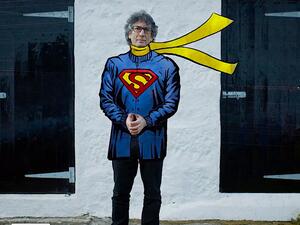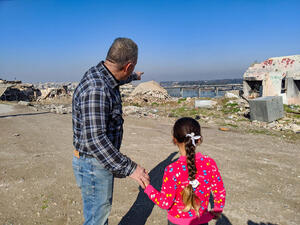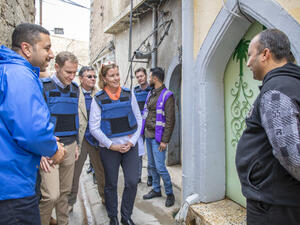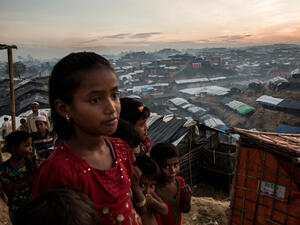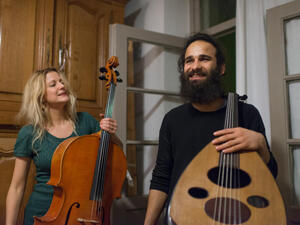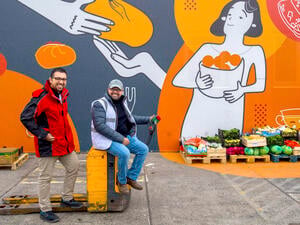The pain of an Iraqi family separated in flight from Ramadi in Anbar province
The pain of an Iraqi family separated in flight from Ramadi in Anbar province

Imad, aged 28, with two of his children in the Arbat site in Sulaymaniyah province. They fled from Ramadi in Anbar province, where relatives are trapped, including eight-year-old Zaynib and her grandparents. "it's hardest for my daughters," Imad said, "they miss their older sister."
ARBAT, Iraq, May 13 (UNHCR) - After months of uncertainty, Imad, Nithal and three of their children fled the central Iraqi city of Ramadi in mid-April when clashes between government forces and militants spilled into their neighborhood. A decision they had to make so quickly, they weren't able to bring their eldest daughter with them.
"I had never seen fighting like this before," 24-year-old Nithal told UNHCR at the Arbat camp for internally displaced people (IDP) in north-east Iraq's Sulayminayah province, where she and her family are now sheltering.
Born in Ramadi, capital of Anbar province, Nithal became used over the years to hearing fighting and clashes in the distance, but on April 15 the violence came closer than ever before. A gun battle broke out on the street behind her home and three people were shot dead in front of her. "My children saw it too. We were all crying, but I tried to cover their eyes with my hands," she told UNHCR.
Imad and Nithal fled the next day, but overnight fighting had cut off the only road linking Ramadi to their eight-year-old daughter, Zaynib, who was visiting her grandparents in another town. As the family joined the growing number of internally displaced people in Iraq, they were only able to take three of their four children.
Imad says he calls Zaynib every day, but she just sobs, unable to talk. "As soon as she hears my voice, she cries," said Imad, who knows that it is too dangerous to try and fetch her.
The Iraqi government says the violence in Anbar province over the past month has displaced about 114,000 people from Ramadi district. They have spread across 15 of Iraq's 18 provinces with many finding shelter on the outskirts of Baghdad. UNHCR has provided assistance to many families in these sites.
Thousands of families, unable to meet the sponsorship requirements for entry into Baghdad, have fled further afield to Sulaymaniyah province, which has no border with Anbar. In Sulayminayah, UNHCR is working to make space available in existing IDP camps and has prepared the newly opened Qoratu site to receive families from Anbar and other areas.
"We're coordinating with the authorities to make space available for newly arrived families who wish to come to the camp," said Anne Dolan, the head of UNHCR's Sulayminayah office, "and we stand ready to make referrals and help to coordinate assistance if the need grows."
At the moment UNHCR does not expect more arrivals in Sulaymaniyah because the local government closed the province to Anbaris on April 21, citing security concerns and lack of resources, but the needs of existing families could grow if they are unable to return home soon.
After fleeing Ramadi, Imad and his family first sought refuge in Baghdad, just east of Anbar, but ended up joining a dozen other families in a bus convoy to Sulaymaniyah. They arrived at the Arbat IDP camp almost two weeks ago. The facility, initially designed as a transit centre for 700 Iraqi families, now houses some 3,000 families, or 18,000 people. Water is in short supply, electricity is intermittent and the sanitation systems are inadequate. The site has fewer than 500 latrines and 600 showers.
"It was a very, very difficult decision to leave home," Imad said, while adding: "It was difficult to decide to come here because I knew what it would be like." Upon arrival, Imad and his family were given blankets, mattresses and an electric heater. Another family lent them a makeshift shelter made of branches and thick flannel blankets.
Imad and Nithal say they are constantly thinking of Zaynib back in Anbar. "Now there's no way for her to leave that place," Imad said, referring to the town where his daughter is staying, cut off by the fighting.
The parents said they long to be reunited with Zaynib. "God-willing I hope so soon," Imad said, before admitting, "Really, I don't think we will see her for some time now."
While the violence in Anbar province has eased slightly, it would be very dangerous to try and return to Ramadi. They would have to transit through Baghdad, but the government has barred most Anbaris from entering the capital. Officials say security concerns are behind the new regulations.
In Arbat, meanwhile, the three children with Imad and Nithal grow restless in the afternoon heat. Nour, the youngest daughter, throws a tantrum. Nithal quietly tries to cool her down, wiping her face with a damp cloth.
Imad fans his son with a towel, repeating phrases in calming tones. "Don't worry, your sister will be here soon, maybe we'll go home tomorrow," he said over and over. Then turning to a UNHCR visitor, he admitted: "I only say these things to make them feel better."
By Susannah George in Arbat, Iraq

